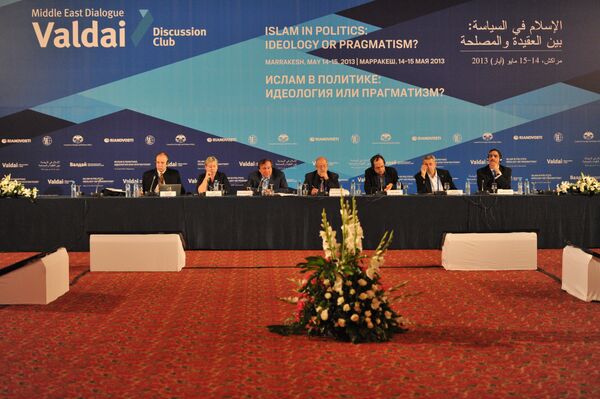MOSCOW, August 21 (RIA Novosti) – The Syrian government’s resilience in its more than two-year fight against an increasingly Islamist insurgency was a factor that encouraged the Egyptian military to overthrow its Islamist president, a Russian pundit said while releasing a new report Wednesday.
“The secular regime of [Syrian President Bashar] Assad managed to survive, and this prompted the [Egyptian] army to act,” Veniamin Popov of the Moscow State Institute of International Relations said during a presentation of a report on Islamist versus secular forces in the Arab world.
The Egyptian coup and the Syrian civil war are just two examples of the secular-versus-Islamist standoff that is at the core of ongoing turmoil in the Arab world, said the report, authored by members of the Valdai International Discussion Club.
The report, titled “Islam in Politics: Ideology or Pragmatism?,” was based on the results of the Middle East Dialogue conference, organized by the Valdai Club in Morocco in mid-May and attended by numerous high-profile politicians from the region.
Islamists acquired a major role in the region’s politics after the “Arab Spring,” a wave of revolutions that began in late 2010, triggered by economic problems and the public’s fatigue from corrupt and authoritarian ruling elites, the report said.
Regimes were changed in Tunisia, Yemen, Libya and Egypt; Bahrain and Syria were engulfed in internal armed conflicts; and a number of countries, including Algeria, Kuwait and Morocco, saw major protests as part of the Arab Spring. In Egypt, turmoil continued as President Mohamed Morsi, elected after the 2011 revolution, was ousted last month in a military coup that followed mass street protests against his Islamist policies. Subsequent counter-protests by Morsi’s supporters were dispersed by acting government forces, resulting in more than 800 deaths so far, according to official figures.
Pundits and politicians fail to agree on whether the Islamists are capable of becoming a valid replacement for the old regimes, the report said.
Islamists have a short and patchy track record on both governance and democratic freedoms, and are often accused of only adopting democratic procedures for the sake of coming to power with the ultimate goal of establishing a theocratic dictatorship, the report said.
But the time that passed since the start of Arab Spring was not enough for any political force to implement any significant economic, social or political change, the report added.
Moreover, political Islamists are not a solid group, but come in several varieties, including liberals, conservatives who support the Islamization of their societies though disagree on whether the process should be fast or gradual, and the anti-systemic radicals ready to use violence to create a sharia state, report co-author Vitaly Naumkin, who heads the Institute of Oriental Studies at the Russian Academy of Sciences, said at the presentation Wednesday.
Their contending between one another and with secular political forces, which retain broad political support despite a string of setbacks, upsets the geopolitical balance of power in the region, prompting alliances between traditional enemies and spats between old allies, Naumkin said.
He cited as an example the theocratic Saudi Arabia backing the recent secular military coup in Egypt, which ousted from power the Muslim Brotherhood – a group that subscribes to a version of Islamism different from the Saudi one. “The region’s geopolitical architecture is in total uproar,” Naumkin said.
“The pendulum will go on swinging between secular and religious forces for a long time because neither is ready to cooperate … which goes for all Arab countries,” said Popov, who also co-authored the report. “If they are unable to work out a compromise and start developing the state … the clashes will continue.”


